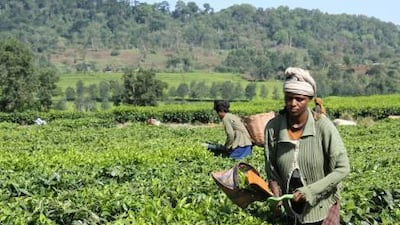MASHA WOREDA, ETHIOPIA // Fitsum Muiugeta slurps a spoonful of tea, swishes it around his mouth and spits it into a nearby pot. At the tea market, he says, taste is everything.
"The process of making the tea sets the price, so when we taste it, we know how it will stand up on the international market," said Mr Muiugeta, the manager of the Chewaka tea estate factory, who samples the company's teas every hour, to keep the quality consistent.
East African Agribusiness, which owns the estate, set up an office in Dubai last year. It is hoping to tap into the valuable Arab market, which accounts for a quarter of the world's tea.
By international standards, at barely over five square kilometres, Chewaka is only a medium-sized operation. The estate, which opened in the mid-1990s, is 1,800 metres above sea level, and 630km south-west of the capital Addis Ababa.
But as one of only three tea plantations in Ethiopia, the company regularly sends its export-quality Simba brand tea to private buyers and the Dubai Tea Trading Centre. The trading centres evaluate a sample of the tea, and offer a price.
For East African Agribusiness, while sending a sample to Dubai puts them closer to their target market, sending samples to both centres offers them the chance to sell to the highest bidder.
While the country only produces a small amount of the world's tea, Sanjah Sethi, the director of the Dubai Tea Trading Centre, sees a lot of potential in its vast swaths of fertile land and favourable climate.
"Ethiopian teas could have good body, be fairly brisk and bright and of a fairly good standard if manufactured well," he said.
With consistent quality and supply, he would be happy to take much more of Ethiopia's tea. Tea from Kenya, the continent's biggest producer, and other African countries are regularly traded in Dubai.
But while African teas possess the characteristics desired by Arab buyers, the industry needs more investment.
That should come. While Ethiopia's government has long focused on production of Arabica coffee beans, it is now encouraging investors to take a second look at tea.
Last year, the agriculture ministry announced that it had identified about 50,000 square kilometres of land that were suitable for tea production, and is offering subsidised land, tax exemptions and easy loans to buy land.
"A lot of investors come from Kenya and are considering Ethiopia because of the availability of land," said Yohannes Woldekidan, the deputy general manager of East African.
East African also plans to expand its operations by another 50 square kilometres, and has attracted attention from Dubai World. In 2009, the company was set to partner with Dubai World to develop land in nearby Illubabor.
At the time, Dubai World had planned a $300 million investment. Though it has since been scaled back, East African plans to add 20 square kilometres next year.
Cleaning virgin land is labour and capital intensive, costing more than Dh2m to develop each square kilometre. That, according to Henok Mesfin, East African's general manager, limits the company to developing an extra two or three square kilometres a year.
And the infrastructure is not always up to the task. The Chewaka estate usually relies for its power on a nearby hydroelectric plant.
"It broke down a while ago, and now we're waiting for the replacement parts," said Mr Mesfin. By the end of the year he expects the hydroelectric plant to power the estate's operations. By the end of next year, he is hoping it will power workers' houses, too.
Location is key. Though secluded - the nearest town, Gambella is a four-hour drive away - the estate is high enough in the mountains that pests are virtually non-existent. Discarded branches from the tea plants are left on the ground to act as compost.
"There's potential to get organically certified," said Hiruy Yimam, the head of business development. "We're essentially organic because of the rainfall and lack of pesticide and fertilisers."
Workers are allocated their own plots of land, which some use to raise animals, others fruits and vegetables. A handful harvest their own tea.
They earn about Dh9 a week cutting and packing the tea leaves, three times what they would make in other jobs in the nearby villages.
Befekadu Tonja, 21, applied to the estate five years ago, after being unable to find work near his village Walide, 600km away in Southern Ethiopia. He met his wife at the estate, and has used their joint income to buy two cows and an ox.
"We're planning to improve our living," he says. "We have a house, and land for vegetables, and will buy more."
Dubai is centre of tea-junction
Satisfying the thirst for tea of a region that drinks more of it per head than anywhere else is no mean feat.
But the Dubai Tea Trading Centre aims to do just that.
In 2009, the average drinker in the region drank 1.33kg worth of tea, more than double the worldwide average of 530 grams.
Nearly 4,500 tonnes of tea were sold in the UAE that year, up 9 per cent on 2008, according to the research company Euromonitor. Most of it came from Sri Lanka, India and Kenya.
The Dubai centre benefits from being located close to so many tea-drinking nations, according to the Sanjah Sethi, the centre’s director.
The centre provides producers and exporters with an opportunity to “be based much closer to the buyers”, said Mr Sethi, with the result being greater demand for their teas during the centre’s auctions.
* The National
This article has been corrected since its original publication. East African Agribusiness does not yet send tea to the Mombasa Tea Auction, as originally stated.

